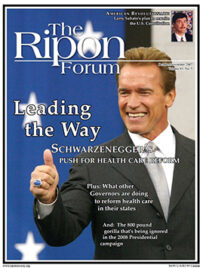
Lacking the overwhelming bipartisan accord that created the State Children’s Health Insurance Program nearly a decade ago, Democrats in Congress have instead opted for a massive liberalization of the program that dilutes its primary mission: covering children.
This bill, as passed by the House (where there wasn’t a chance to amend the bill) and Senate, clearly isn’t about helping low-income children. If it was, it would have support from both parties and the president would be eagerly waiting to sign it into law. This is a missed opportunity.
Virtually everyone supports providing health insurance to low-income children. But when a federal health program for children starts covering not only families, but childless adults making three and four times the poverty level, it has unmistakably lost its focus.
It is plain to see that Democrats want taxpayers to fund and the federal government to directly provide health care benefits to millions of more Americans — even for those families making over $80,000 a year. They are using SCHIP as a vehicle, and the children it is intended to cover as a shield, to get one step closer to total government control over our health care system. This kind of medicine needs more than a teaspoon of sugar to swallow.
The current plan to expand the State Children’s Health Insurance Program is in dire need of a second opinion. Instead of moving further and further away from the core mission, we should be reforming the program to ensure it is truly helping America’s uninsured children.
Let’s look at some facts about the “new, improved” SCHIP:
1. Shifting, not adding, insurance — The non-partisan Congressional Budget Office stipulates that the proposed expansion of SCHIP would cover an additional 5.8 million Americans at a cost of $35 billion. Alarmingly, CBO also states that more than one out of every three of those individuals (some children and some adults) already has private insurance. Some experts suggest that number is as high as six in 10.
Either way, it is clear that the SCHIP bill does little more than move children and upper-income families from private insurance plans to taxpayer-funded plans. That is why it should not surprise anyone that when HillaryCare first came about, one of three options to obtain universal, government coverage followed this exact model: start with kids, move on to the entire family, and soon you will have everyone enrolled in a government program.
…when a federal health program for children starts covering not only families, but childless adults making three and four times the poverty level, it has unmistakably lost its focus.
That kind of slow creep is a prescription for the government largess that stifles economies and unduly burdens taxpayers. It is not a prescription for reducing the number of uninsured Americans.
2. States get more money, but some states don’t — States and children advocates should take a second look at this bill. Because of shoddy funding sources, this bill is likely to harm more states and health care programs than it purports to help. A Heritage Foundation study showed that as many as 28 states, including my home state of Michigan, stand to have a net loss of $10 to $700 million in revenue.
3. Kids born today lose coverage at age six — Supporters of this SCHIP expansion state that the program is fully funded. However, when you look closely at the details you find a giant funding cliff after five years. In year six, after five straight years of increases, funding reverts to 65% below current levels. That is quite a budgetary slight-of-hand given that the program’s average cost is pegged at roughly $12 billion a year. So, what happens in year six? Do taxes go up to cover the shortfall? Is coverage eliminated for millions of kids that just entered the program?
4. With apologies to the American Cancer Association: Light up…it’s for the kids — As ridiculous as the assumption that the program costs nothing after five years, is the assumption that there will be 22 million new smokers to pay for this program. Being built upon the foundation of a new federal 61 cent per pack tax on cigarettes, the program will quickly go up in smoke.
Over the years we have learned that the more we tax any activity, but especially cigarettes, the less likely people are to engage in the activity. To that end, cigarette taxes have been a great health care policy. Even if we forget how terribly regressive this tax is – falling heaviest on lower-income Americans (those ironically targeted for help under SCHIP) – it is clear that a cigarette tax may be the worst possible stream of revenue for an ongoing program.
This bill is designed poorly, funded poorly and will do little to help lower-income Americans obtain health care coverage. The president should veto this bill and Congress should work in a bipartisan fashion — as we did nearly ten years ago when the program was created — to make certain children in America have access to the health care system.
Dave Camp represents the 4th District of Michigan in the House of Representatives. He serves as the ranking member of the Ways and Means Health Subcommittee.




